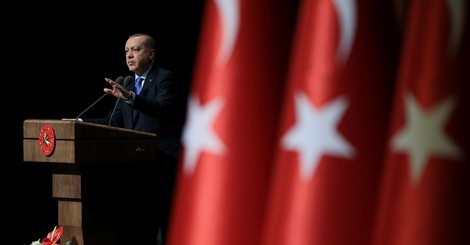Your podcast discovery platform
Curious minds select the most fascinating podcasts from around the world. Discover hand-piqd audio recommendations on your favorite topics.

piqer for: Globalization and politics Global finds
Sezin Öney, originally from Turkey, is based in Budapest and Istanbul. She her journalism career as a foreign news reporter in 1999 and she turned into political analysis as a columnist since 2007. Her interest in her main academic subject area of populism was sparked almost decade ago; and now she focuses specifically on populist leadership, and populism in Turkey and Hungary. She studied international relations, nationalism, international law, Jewish history, comparative politics and discourse analysis across Europe.
The Entirely Rational Basis For Turkey's Move Into Syria
Turkey has just embarked on another military incursion into Syria. Turkish ground troops have crossed into northern Syria's Afrin region as part of an offense to push out Kurdish militia, known as the YPG, which Turkey regards as terrorists.
Steven A. Cook, a senior fellow for Middle East and Africa studies at the Council on Foreign Relations (CFR) based in Washington DC, looks into the "rational side" of Turkey's military operation—"rational" from Ankara's perspective and the Turkish nationalist angle. In doing that Cook makes a reference to the Treaty of Sèvres:
In 1920, the victors of World War I forced the Ottomans to sign the Treaty of Sèvres, which detached what would become Lebanon, Syria, Jordan, and Israel from the House of Osman. The agreement also granted the French a zone of influence in the southeastern portion of Anatolia, adjacent to its Mandate for Lebanon and Syria, while the Italians were ceded an area that included southern and central parts of Anatolian territory, including Antalya and Konya. The Greeks established a protectorate in Smyrna, now known as Izmir. In response, an Ottoman officer named Mustafa Kemal, later known as Atatürk, and a cadre of nationalist collaborators, raised an army and drove the Allies out of what became the Republic of Turkey on October 29, 1923. Despite Atatürk’s triumph and Turkey’s subsequent growth into a regional power, the dissection of the empire and the attempted division of its remnant has sowed a profound and pronounced mistrust of foreign powers—even allies—in Turkey’s political culture.
According to Cook, Turkish fears of "internal division" have once again been revoked with the US armament of YPG. Hence, Cook argues, the Turks concur that US supports a Kurdish territory in Syria – a "terrorist state".
As Cook himself notes, had Turkey resolved its own Kurdish question peacefully, would there even be a military operation now? Unlikely, but it is allegedly "rational" to live the fears of 1920, a hundred years on.

The irony is, at the end of World War One, the Turkish state was engaged in one of the worst genocides in human history, so there is absolutely no way they can in good conscience view the period as one of national suffering. Indeed they were the ones inflicting the suffering on others - the Armenians.